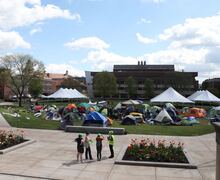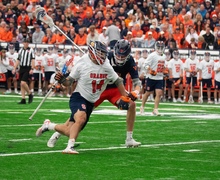Office of Academic Affairs hosts academic freedom panel to navigate Israel-Hamas War
Maxine Brackbill | Photo Editor
The panels seek to encourage faculty and students to support and understand one another amid the ongoing Israel-Hamas war.
Support The Daily Orange this holiday season! The money raised between now and the end of the year will go directly toward aiding our students. Donate today.
Amid the ongoing Israel-Hamas war, Syracuse University’s Office of Academic Affairs organized a series of panels on navigating dialogue in the classroom and addressing academic freedom, the first two of which were held Monday and Tuesday.
The office hosted a faculty panel Monday on active listening and invited two professors from Dartmouth College Tuesday morning to speak about “navigating civil dialogue.” Both panels encouraged faculty members and students to support and understand each other as they navigate complex conflicts.
The panels came after Chancellor Kent Syverud said the university is prioritizing student safety over free speech and academic freedom during a Nov. 15 University Senate meeting.
Tuesday morning’s Zoom panel featured Tarek El-Ariss, Dartmouth’s chair of Middle Eastern Studies, and Susannah Heschel, the college’s chair of Jewish Studies. The two co-teach a class titled, “Arabs, Jews and Constructions of Modernity” and have been featured on NPR and PBS speaking about campus discourse during the Israel-Hamas war.
El-Ariss said viewing ongoing conflicts in the context of the past creates a deeper understanding.
“We can understand the power differential that we have today, you have an occupation and so on, that’s very important,” El-Ariss said. “But also you need to go back and understand the history because what’s important is to imagine also a future.”
Margaret Talev, the Kramer director of SU’s Institute for Democracy, Journalism and Citizenship, moderated Tuesday’s panel. Following opening remarks from Vice Chancellor and Provost Gretchen Ritter, Talev guided the conversation about the professors’ origins in scholarship and their opinions about cultivating productive dialogue.
Regarding the Israel-Hamas war, Heschel said she is feeling an “odd combination” of rage, terror and despair. She said it’s important to consider the impact of these strong emotions, and noted that “being wrapped up in rage” won’t move anything forward.
“At some point, we have to pause and think about what we’re experiencing and how we can get a hold of it,” Heschel said. “Extreme anxiety, for example, can lead to binary thinking, can lead to rigidity.”
Ritter brought up the stark contrast in how people of different generations are responding to the conflict. Over 40% of people under 30 had a favorable opinion of Israel, compared to 60% of people between the ages of 50 and 64, according to a 2022 study done by the Pew Research Center. Ritter asked the panelists how universities and faculty should bridge some of this divide.
Both Heschel and El-Ariss said it is important to create a space to acknowledge the feelings of faculty and students. Though El-Ariss acknowledged he doesn’t have the power to resolve the feelings students are experiencing, he said he is always open to speaking with students at Dartmouth.
Heschel stressed that faculty should support each other in these situations, saying students will feel safer if they “don’t have a sense that faculty are attacking one another.”
As the war approaches two months since Hamas’ initial Oct. 7 attack, SU professors and teaching assistants have had to navigate tension in classroom settings when discussing the conflict.
“Faculty need to come together in a time of crisis and create an atmosphere of calm and reassurance for students, and where there are wars of one professor against another in a department or departments against each other, that’s going to create a very bad atmosphere for students and make students feel unsafe,” Heschel said.
Heschel agreed that moderation and respect are key in sensitive conversations on topics like the Israel-Hamas war.
Heschel also said as people in the United States are “horrified” by the Israel-Hamas war, they are looking to academia — both students and professors alike — as “cultural leaders.” In the last few weeks, however, Heschel said she and El-Ariss have felt that humanities and interdisciplinary studies are “in danger.”
“They’ve looked to us for some guidance, some advice and inspiration, reassurance, and instead too many of us have been angry and saying things that are actually quite inappropriate for a public forum,” Heschel said.
Similar to Tuesday’s event, the panel on Monday was centered on how professors can address difficult topics in the classroom and create a safe space for students.
William Robert, SU’s religion department chair; PJ DiPietro, the director of undergraduate studies for Women’s and Gender Studies and Jonna Gilfus, director of undergraduate studies for Writing Studies, Rhetoric and Composition sat on the event’s panel.
Marcelle Haddix, associate provost for strategic initiatives, moderated the discussion. She emphasized how productive but safe conversations with students can create engaging environments.
“Setting the stage or the tone up front, and having the conversation with everyone in the classroom … these are the things that we’re going to help with discussion around, and that we can come to some collective agreement understanding that each person brings their individual self into the space,” Haddix said.
The Office of Academic Affairs will host two more faculty panels on academic freedom and navigating polarizing discourse in the next two weeks. The panels are scheduled for Thursday at 1 p.m. and Dec. 6 at 3:30 p.m., respectively, and both will be held in Room 500 in the Hall of Languages.
Published on November 28, 2023 at 10:45 pm
Contact Dominic: [email protected] | @DominicChiappo2





